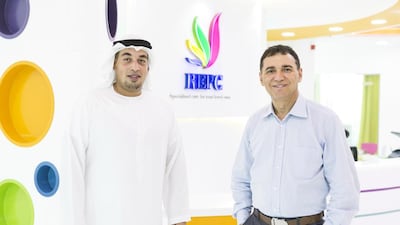UMM AL QUWAIN// A year ago, Sheikh Hamad bin Abdulaziz Al Mualla went public about his struggle with dyslexia in an article in The National.
Now, the 29-year-old has decided to set up a clinic to help youngsters overcome the condition.
From the age of nine, Sheikh Hamad was taught at Mark College Somerset in the UK, a specialist school for children with learning difficulties.
He spent 19 years in Britain but when he returned to the UAE he realised that there were still many stigmas attached to dyslexia in this country, with many people mistaking the condition for laziness.
He envisaged a clinic to help parents and children and to raise awareness of dyslexia.
Next week, the Royal European Pediatric Clinic will open in the J3 Mall in Dubai, which will give seminars to parents to help them understand the learning difficulty and to look out for signs of the condition in their children.
He believed The National’s article helped publicise the cause.
“From the article, I got many contacts who were organisations for learning difficulties and dyslexia from the UK, US and Canada who wanted to help me and be a part in my mission,” said Sheikh Hamad, who has co-founded the clinic with his cousin Sheikh Abdullah bin Rashid Al Mualla.
“So, after I saw so much support after the article and got such positive feedback from my society, I had the push to establish the platform.”
He insisted all the seminars at the clinic would be free.
“It is ethically wrong for me to charge even one Dirham for them and it is my duty to give them the help and do something for them as well. I am one of them, and my country gave me the full support to get me to this stage, and it is the time to return something to my country,” he said.
“Also my country is trying its best to have the best education system for those who suffer from learning difficulties, and I am going to contribute my knowledge, experience, research and contacts to raise this and make the right structure happen in the UAE,” he said.
Sheikh Hamad also works with Dyslexia International, a non-profit organisation linked to Unesco that serves the interests of children and adults with reading difficulties.
“I am honoured to be with them and be given the title of advocate for children and adults with dyslexia world wide, and I will be in Unesco representing them,” he said.
Dr Antonio Martins, chief medical officer at the clinic, said that learning disabilities were a challenge to society because 20 to 25 per cent of children suffered from them.
He hoped his role at the clinic would give children an opportunity in society because these individuals have difficulty in school and often leave early, making it difficult to integrate.”
“They could never get a proper job, and then they could become terrorists in society,” he said.
The clinic has hired nutritionists, psychologists, paediatricians, gastrologists and neurologists to work there.
roueiti@thenational.ae

